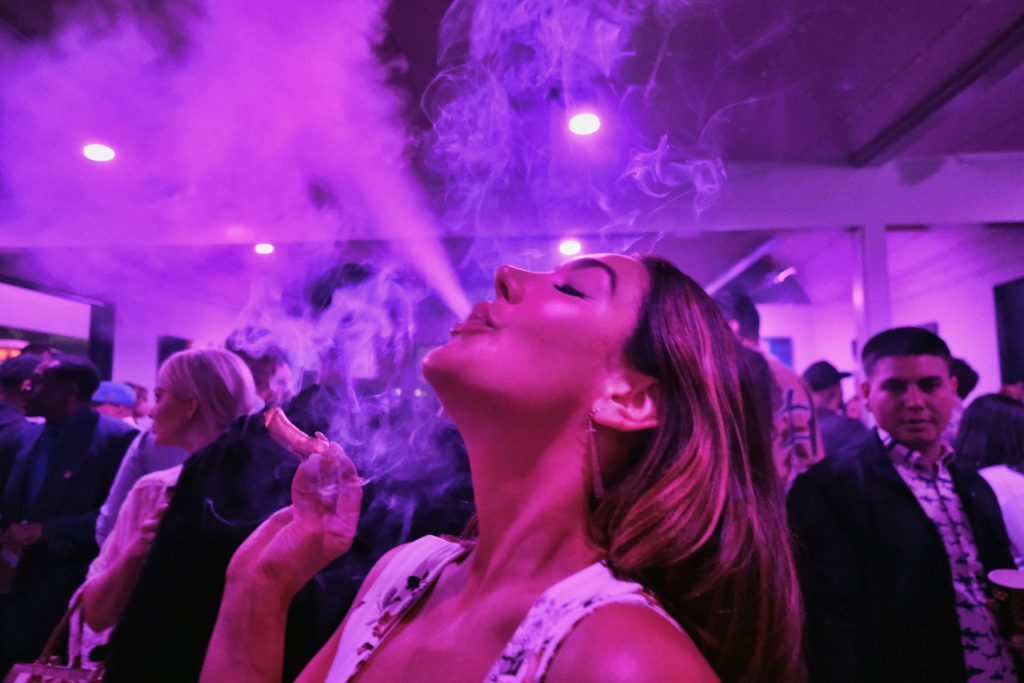By GENE JOHNSON (Associated Press)
SEATTLE (AP) — Saturday marks marijuana culture’s high holiday, 4/20, when college students gather — at 4:20 p.m. — in clouds of smoke on campus quads and pot shops in legal-weed states thank their customers with discounts.
This year’s edition provides an occasion for activists to reflect on how far their movement has come, with recreational pot now allowed in nearly half the states and the nation’s capital. Many states have instituted “social equity” measures to help communities of color, harmed the most by the drug war, reap financial benefits from legalization. And the White House has shown an openness to marijuana reform.
Here’s a look at 4/20’s history:
WHY 4/20?
The origins of the date, and the term “420” generally, were long murky. Some claimed it referred to a police code for marijuana possession or that it derived from Bob Dylan’s “Rainy Day Women No. 12 & 35,” with its refrain of “Everybody must get stoned” — 420 being the product of 12 times 35.
But the prevailing explanation is that it started in the 1970s with a group of bell-bottomed buddies from San Rafael High School, in California’s Marin County north of San Francisco, who called themselves “the Waldos.” A friend’s brother was afraid of getting busted for a patch of cannabis he was growing in the woods at nearby Point Reyes, so he drew a map and gave the teens permission to harvest the crop, the story goes.
During fall 1971, at 4:20 p.m., just after classes and football practice, the group would meet up at the school’s statue of chemist Louis Pasteur, smoke a joint and head out to search for the weed patch. They never did find it, but their private lexicon — “420 Louie” and later just “420” — would take on a life of its own.
The Waldos saved postmarked letters and other artifacts from the 1970s referencing “420,” which they now keep in a bank vault, and when the Oxford English Dictionary added the term in 2017, it cited some of those documents as the earliest recorded uses.
HOW DID ‘420’ SPREAD?
A brother of one of the Waldos was a close friend of Grateful Dead bassist Phil Lesh, as Lesh once confirmed in an interview with the Huffington Post, now HuffPost. The Waldos began hanging out in the band’s circle and the slang spread.
Fast-forward to the early 1990s: Steve Bloom, a reporter for the cannabis magazine High Times, was at a Dead show when he was handed a flier urging people to “meet at 4:20 on 4/20 for 420-ing in Marin County at the Bolinas Ridge sunset spot on Mt. Tamalpais.” High Times published it.
“It’s a phenomenon,” one of the Waldos, Steve Capper, now 69, once told The Associated Press. “Most things die within a couple years, but this just goes on and on. It’s not like someday somebody’s going to say, ‘OK, Cannabis New Year’s is on June 23rd now.’”
While the Waldos came up with the term, the people who made the flier distributed at the Dead show — and effectively turned 4/20 into a holiday — remain unknown.
HOW IS IT CELEBRATED?
With weed, naturally.
Some celebrations are bigger than others: The Mile High 420 Festival in Denver, for example, typically draws thousands and describes itself as the largest free 4/20 event in the world. Hippie Hill in San Francisco’s Golden Gate Park has also attracted massive crowds, but the gathering was canceled this year, with organizers citing a lack of financial sponsorship and city budget cuts.
College courtyards and state government building lawns are also famous for attracting 4/20 celebrations. The University of Colorado Boulder used to have one of the largest events, but it has decreased since the school banned the annual smokeout over 10 years ago.
Some breweries produce beers with a 420 theme, but they are not infused with marijuana. This includes SweetWater Brewing in Atlanta, which is hosting a 420 music festival this weekend. The founders of the brewery attended the University of Colorado.
Lagunitas Brewing in Petaluma, California, launches its “Waldos’ Special Ale” every year on 4/20 in collaboration with the creators of the term. The Waldos will be at the brewery this Saturday to taste the beer, which they selected for having “hops that smell and taste like the dankest marijuana,” according to one of the Waldos, Dave Reddix, in an email.
4/20 has also become a significant industry event, where vendors come together to sample each other's products.
THE POLITICS
The number of states allowing recreational marijuana has increased to 24 after recent campaigns led to legalization in Ohio, Minnesota, and Delaware. An additional 14 states permit it for medical purposes, including Kentucky, where medical marijuana legislation passed last year will become effective in 2025. Some states only allow products with low THC, the main psychoactive ingredient in marijuana, for specific medical conditions.
However, marijuana remains illegal under federal law and is classified under Schedule I of the Controlled Substances Act, along with drugs such as heroin. This means it is considered to have no accepted medical use at the federal level and a high risk of abuse.
The Biden administration has taken some steps toward reforming marijuana laws. The president has granted clemency to thousands of individuals convicted of “simple possession” on federal land and in the District of Columbia.
Last year, the Department of Health and Human Services recommended to the Drug Enforcement Administration that marijuana should be reclassified as Schedule III, which would acknowledge its medical use under federal law.
Based on a Gallup poll from last fall, 70% of adults support legalization, the highest level ever recorded by the polling firm and more than double the roughly 30% who supported it in 2000.
Vivian McPeak, who helped establish Seattle’s Hempfest over 30 years ago, commented on how much the marijuana industry has developed during his lifetime.
“It’s surreal to see stores selling cannabis,” he remarked. “Many people laughed at us, saying, ‘This will never happen.’”
WHAT DOES IT MEAN?
McPeak described 4/20 these days as a “mixed bag.” Despite the progress of the legalization movement, many smaller growers are finding it difficult to compete against large producers, and many Americans are still incarcerated for marijuana convictions.
“We can celebrate the victories that we’ve had, and we can also strategize and organize to further the cause,” he stated. “Despite the kind of complacency that some people might feel, we still have work to do. We need to continue putting in effort until we get everybody out of jails and prisons.”
For the Waldos, 4/20 primarily represents a good time.
“We’re not involved in politics. We’re jokesters,” Capper has said. “But there was a time that we can’t forget, when it was secret and furtive. … The atmosphere at that time was more charged and exciting in a certain way.
He said it's not good that they were putting people in jail and no one would want to go back there.
___
Associated Press writer Claire Rush contributed from Portland, Oregon.



